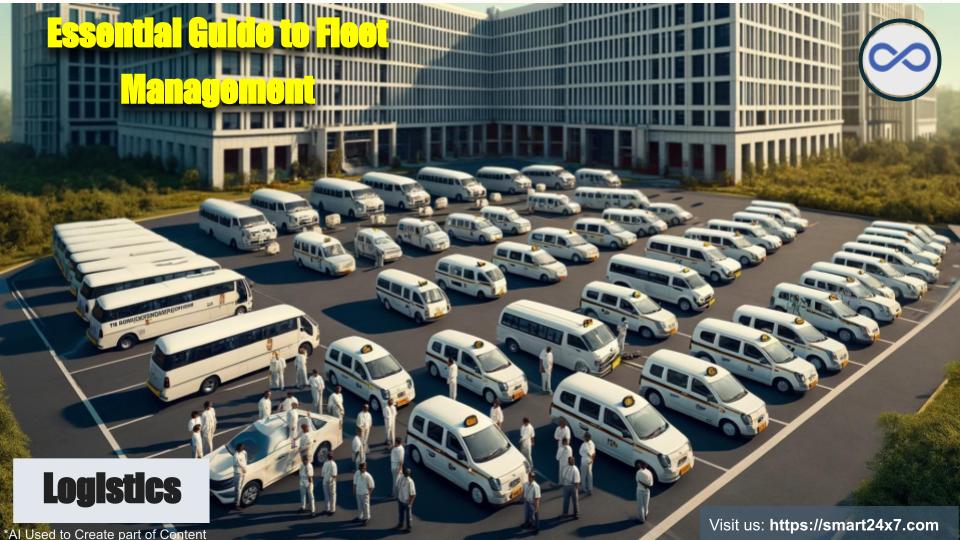News from Logistics Industry
The Essential Guide to Fleet Management
Fleet management in 2024 has evolved significantly, thanks to advanced technologies and changing industry dynamics. At Smart24x7, a leading SaaS-based logistics platform, we understand the complexities and demands of modern fleet operations. Our comprehensive approach to Fleet Management empowers businesses to optimize their logistics, enhance efficiency, and reduce costs. Here’s our essential guide to mastering Fleet Management in today’s fast-paced environment.
Embracing Technology for Enhanced Fleet Management
Integration of IoT and Telematics:
- Real-time Tracking: Utilize GPS and IoT sensors for live tracking of vehicles. This enables precise location management and helps in dynamic route optimization.
- Vehicle Health Monitoring: Sensors provide real-time data on vehicle health, predicting maintenance needs before they lead to costly downtime.
Advanced Analytics and Data Management:
- Predictive Analytics: Leverage historical data and AI to forecast fleet maintenance needs and optimize routes.
- Data-Driven Decision Making: Use collected data to enhance operational decisions, reducing fuel consumption and improving delivery times.
Optimizing Fleet Management Operations with Automated Solutions
Automated Dispatch and Scheduling:
- Efficiency at Scale: Automatically assign tasks to drivers based on proximity, vehicle capacity, and driver availability, maximizing the use of resources.
- Driver Scheduling: Optimize driver schedules to comply with labor laws and reduce fatigue-related incidents.
Enhanced Safety Measures:
- Driver Behavior Monitoring: Implement systems that track driving patterns to encourage safe driving behaviors.
- Advanced Driver Assistance Systems (ADAS): Equip fleets with technology like collision avoidance systems, lane departure warnings, and more to prevent accidents.
Sustainability: Steering Towards Eco-friendly Practices
Green Fleet Management Initiatives:
- Alternative Fuels: Promote the use of electric and hybrid vehicles to reduce greenhouse gas emissions.
- Fuel Management: Implement strategies to monitor and control fuel usage, minimizing environmental impact and cutting costs.
Carbon Footprint Tracking:
- Emissions Monitoring: Regularly assess the environmental impact of your fleet and set realistic goals for reduction.
- Sustainable Routing: Optimize routes to decrease drive times and reduce fuel consumption.
Cost Management Strategies
Lifecycle Fleet Management:
- Asset Utilization: Monitor and manage the lifecycle of each vehicle to maximize its service life while minimizing repair costs.
- Lease vs. Buy Decisions: Use data analytics to determine the most cost-effective options for your fleet composition.
Insurance and Liability Management:
- Risk Assessment: Regularly evaluate the risks associated with Fleet Management operations and adjust insurance coverage accordingly.
- Compliance Tracking: Ensure all fleet activities comply with regional regulations to avoid fines and penalties.
Enhancing Customer Satisfaction through Reliable Fleet Services
Real-time Customer Updates:
- Transparency in Operations: Provide customers with real-time updates about the status of their deliveries, enhancing trust and satisfaction.
- Feedback Systems: Implement systems to gather and analyze customer feedback to continuously improve service quality.
Tailored Delivery Solutions for Fleet Management:
- Customized Services: Offer flexible delivery options and personalized services to meet diverse customer needs.
- Technology Integration: Use mobile apps and online platforms to make booking and tracking more accessible for customers.
At Smart24x7, we believe that effective fleet management in 2024 revolves around leveraging technology, optimizing operations, and prioritizing sustainability and customer satisfaction. By adopting a strategic approach and utilizing comprehensive solutions like those offered by Smart24x7, businesses can achieve superior fleet efficiency and performance, setting new standards in the logistics sector. Equip your fleet management with the right tools and strategies to thrive in the competitive landscape of 2024 and beyond.

